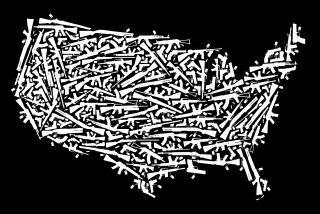Global gunrunner is jailed in U.S.
- Share via
WASHINGTON — The alleged arms deal involved sit-down meetings in Paris and London, a front company in Kyrgyzstan and shipments via Colombia to the ultimate destination, Iran.
But today, the notorious Belgian trafficker charged with arranging the scheme finds himself in a federal jail in Mobile, Ala.
U.S. authorities say Jacques Monsieur, a swashbuckling 56-year-old known as “the Fox” and “the Field Marshal,” conspired with an undercover agent to buy engines and parts for F-5 fighter planes for Iran.
Monsieur faces a six-count federal indictment, unsealed Wednesday, that includes charges of money laundering, smuggling and violating laws against exporting arms to Iran. He has not yet been arraigned.
Investigators arrested Monsieur last week while he was in New York on his way to France, where he lives, officials said. He becomes the latest in a string of high-rollers to fall victim to global undercover arms-trafficking operations by U.S. agents.
“This is obviously a sustained concern for us,” said John Morton, assistant secretary of Homeland Security, who directs Immigration and Customs Enforcement, the lead agency in the case. “This kind of weapons proliferation needs our attention and focus as an agency and a government, and it has it.”
In the last two years, U.S. investigators have gone after elusive kingpins of the arms trade who allegedly benefited for years from the protection of spy agencies.
In 2007 and 2008, Drug Enforcement Administration agents arrested Viktor Bout, a Russian, and Monzer Kassar, a Syrian based in Spain who served as a top informant for Spanish intelligence. In both cases, investigators set up stings in which undercover informants posed as representatives of Colombian guerrillas to draw the suspects into arms deals.
Kassar was convicted of terrorism and arms-related charges in New York last year. Bout remains in Thailand, where a U.S. extradition attempt has run into legal obstacles.
Last month, DEA agents in Honduras used a similar ruse to arrest Jamal Yousef, another Syrian, who allegedly has ties to the Hezbollah terrorist group.
Monsieur, a suave veteran of Belgian military intelligence who breeds horses on a French estate, spent two decades doing business in war zones from the Balkans to Africa.
His specialties are said to be light to medium arms and military aviation parts. He has run afoul of the law in Belgium, France and Iran, according to news reports.
Many arms traffickers cultivate relationships with spy agencies, exchanging information for protection.
In a rare interview with Radio France International in 2004, Monsieur insisted that his career was a cover for longtime work for Western intelligence services.
He claimed in the interview that he had CIA approval when he ran guns to Croatia during the 1990s conflicts in the Balkans.
He figured into a French scandal in which top officials were accused of arming African factions in deals involving kickbacks and oil.
Since the 1980s, when his name came up in the Iran-Contra affair, he has specialized in supplying Iran, according to Alain Lallemand, a Belgian journalist who wrote an extensive report on Monsieur in 2002 for the International Consortium of Investigative Journalists, a branch of the nonprofit Center for Public Integrity.
“His claim of working for intelligence services is not false, but it is exaggerated,” Lallemand said in a telephone interview. “He really has many contacts. It’s clear that he has a real intelligence value that a lot of governments want.”
Testimony during trials in France and Belgium revealed that Monsieur had debriefed French, Belgian and Israeli spies, Lallemand said.
U.S. officials would not comment on Monsieur’s past, including his alleged ties to the CIA or role in the Iran-Contra scandal.
Monsieur was working for the Iranian government in February when he contacted an undercover agent, who was apparently posing as an arms supplier, the indictment alleges.
He said he wanted to acquire engines and parts for F-5 fighter jets used by the Iranian air force, the indictment says.
The U.S. sold those planes, manufactured by Northrop Grumman Corp., to Iran before the 1979 revolution that brought the authoritarian clerical regime to power. In 1995, U.S. officials imposed sanctions restricting arms sales to Tehran, which Washington accuses of sponsoring terrorism and seeking nuclear weapons.
In meetings and e-mails this year, the indictment says, Monsieur told the ICE agent he wanted him to get around the law by obtaining an export license asserting that the jet parts were for a buyer in Colombia.
At a meeting with the undercover agent at a London hotel in May, Monsieur introduced his business partner, Darah Fotouhui, an Iranian living in France, the indictment says. Fotouhui “has been actively working with the Iranian government to procure military items,” according to the document. He remains a fugitive.
In June, Monsieur sent the agent a purchase order from a front company in Kyrgyzstan in a bid to clandestinely send the material to Iran via Colombia and the United Arab Emirates, the indictment charges. He allegedly wired $100,000 to a bank in Mobile as part of a $400,000 down payment.
Officials did not further disclose how Mobile figures in the case.
They also declined to discuss the circumstances of Monsieur’s arrest in New York. But they said his trip -- from a country they wouldn’t name -- was not related to the undercover operation.
--
More to Read
Sign up for Essential California
The most important California stories and recommendations in your inbox every morning.
You may occasionally receive promotional content from the Los Angeles Times.













